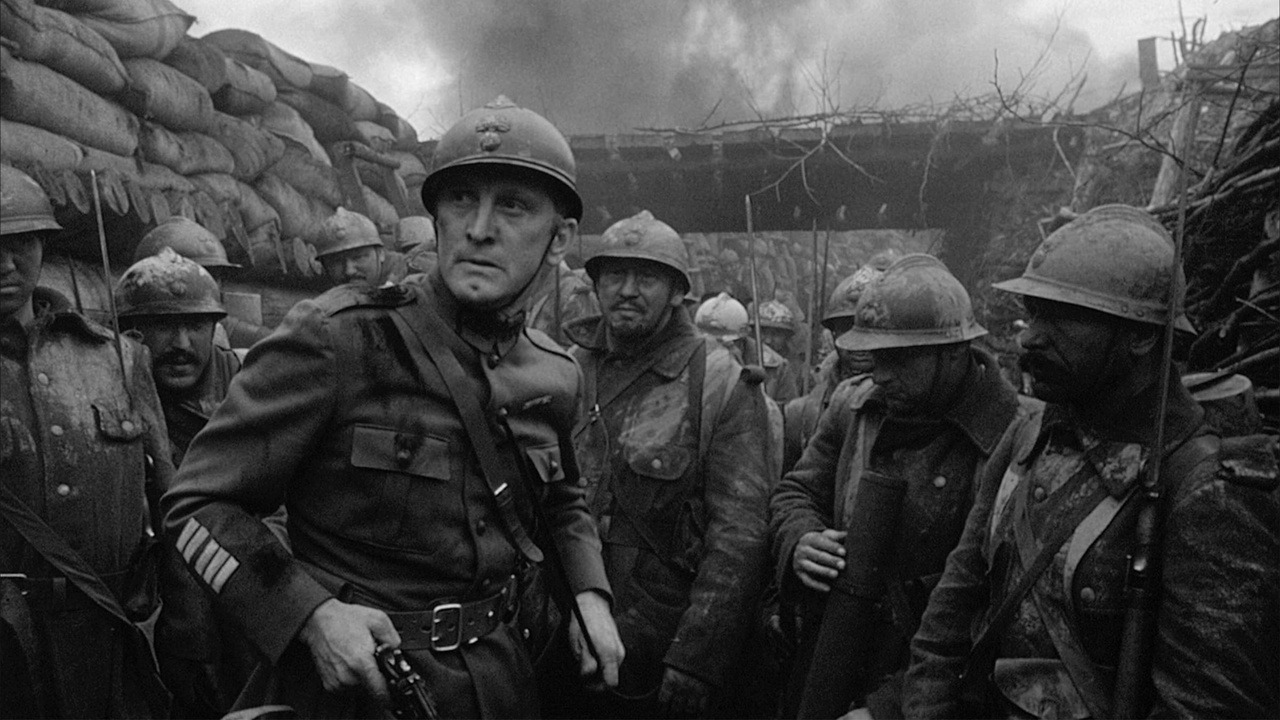“Paths of Glory” (1957)

Stanley Kubrick’s “Paths of Glory,” released in 1957, stands as a poignant critique of the futility and senseless brutality of war. Adapted from Humphrey Cobb’s novel of the same name, the film explores themes of honor, sacrifice, and the dehumanizing effects of military authority.
Set during World War I, the narrative centers on Colonel Dax (played by Kirk Douglas), a commanding officer in the French army. When General Mireau (played by George Macready) orders an impossible and ultimately suicidal attack on a heavily fortified enemy position known as the “Anthill,” Colonel Dax is compelled to lead his men into certain death. The attack fails disastrously, resulting in heavy casualties among the soldiers of the 701st Infantry Regiment.

In the aftermath, General Mireau, unwilling to accept responsibility for the failure, demands that three randomly selected soldiers be court-martialed and executed for cowardice to set an example to the rest of the troops. Colonel Dax, a former lawyer in civilian life, volunteers to defend the accused soldiers during the court-martial proceedings. Through Dax’s impassioned defense, Kubrick exposes the absurdity and injustice of the military’s arbitrary decisions and callous disregard for human life.
Central to the film’s indictment of war is Kubrick’s unflinching portrayal of the soldiers’ plight. The scenes depicting the horrors of trench warfare, the camaraderie among the men, and the psychological toll of combat are stark and unrelenting. Kubrick’s use of deep focus cinematography and long tracking shots immerses viewers in the grim reality of the Western Front, capturing both the physical and emotional devastation wrought by war.

Kirk Douglas delivers a powerhouse performance as Colonel Dax, embodying both strength and vulnerability as he navigates the moral quagmire created by the military hierarchy. Dax’s transformation from a stoic military leader to a passionate advocate for justice underscores the film’s exploration of individual conscience versus institutional oppression.
Beyond its searing critique of war, “Paths of Glory” also delves into themes of class and hierarchy within the military. The stark contrast between the arrogant and disconnected generals, comfortably ensconced in their chateaus far from the front lines, and the courageous but expendable soldiers highlights the inherent injustices of a system that values rank over human lives.

Moreover, Kubrick’s direction is marked by his trademark attention to detail and meticulous craftsmanship. The film’s evocative black-and-white cinematography, combined with its haunting score by Gerald Fried, heightens the sense of despair and inevitability that permeates the narrative. Kubrick’s ability to capture the nuances of human expression and emotion, even in the midst of chaos and carnage, elevates “Paths of Glory” beyond a mere war film to a profound meditation on the ethics of warfare.
In conclusion, “Paths of Glory” remains a landmark achievement in cinema, resonating with audiences for its uncompromising portrayal of the human cost of war and its critique of institutionalized injustice. Stanley Kubrick’s masterful direction, coupled with Kirk Douglas’s unforgettable performance and a resonant script, ensures that the film continues to provoke thought and reflection on the nature of war and the moral dilemmas it presents. Through its depiction of courage, sacrifice, and the struggle for justice in the face of overwhelming odds, “Paths of Glory” stands as a timeless testament to the enduring power of film to confront and challenge its viewers.











